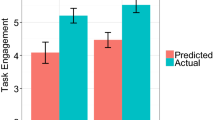Abstract
The effects of task-contingent and performance-contingent extrinsic rewards upon subsequent intrinsic motivation are compared. Intrinsic motivation is measured by behavioral observation in a free time period and by rating scales. The results show, as expected, a higher rating of intrinsic motivation in the performance-contingent reward condition. The study further compares strength of intrinsic motivation in one- and two-session conditions. As hypothesized, a two-session condition, in which the subjects have a preexperience with the task without reward administration, leads to a higher rating of intrinsic motivation than a one-session condition without such a preexperience. The behavioral measure of intrinsic motivation is not significantly affected by the conditions. A post hoc analysis of the data indicates that there may be a different effect of extrinsic rewards on behavioral measures and on rating scale measures of intrinsic motivation.
Similar content being viewed by others
References
Bem, D. J. Self-perception: An alternative interpretation of cognitive dissonance phenomena.Psychological Review 1967,74 183–200.
Deci, E. L. Effects of externally mediated rewards on intrinsic motivation.Journal of Personality and Social Psychology 1971,18 105–115.
Deci, E. L. Intrinsic motivation, extrinsic reinforcement and inequity.Journal of Personality and Social Psychology 1972,22 113–120. (a)
Deci, E. L. Effects of contingent and non-contingent rewards and controls on intrinsic motivation.Organizational Behavior and Human Performance 1972,8 217–229. (b)
Deci, E. L.Intrinsic motivation. New York: Plenum Press, 1975.
Deci, E. L., & Cascio, W. F.Changes in intrinsic motivation as a function of negative feedback and threats. Paper presented at the meeting of the Eastern Psychological Association, Boston, 1972.
Deci, E. L., & Porac, J. Cognitive evaluation theory and the study of human motivation. In M. R. Lepper & D. Greene (Eds.),The hidden costs of reward. Hillsdale, New Jersey: Erlbaum, 1978.
Farr, G. L., Vance, R. J., & McIntyre, R. M. Further examinations of the relationship between reward contingency and intrinsic motivation.Organizational Behavior and Human Performance 1977,20 31–53.
Festinger, L., & Carlsmith, J. M. Cognitive consequences of forced compliance.Journal of Abnormal and Social Psychology 1959,58 203–210.
Fisher, C. D. The effects of personal control, competence and extrinsic reward systems on intrinsic motivation.Organizational Behavior and Human Performance 1978,21 273–288.
Freeman, B. J. Behavioral contrast: Reinforcement frequency or response suppression?Psychological Bulletin 1971,75 347–356.
Garland, H., & Staff, P. E. The overjustification effect. Reward contrast and reattribution in rats.Motivation and Emotion 1979,3 35–49.
Greene, D., & Lepper, M. R. Effects of extrinsic rewards on children's subsequent intrinsic interest.Child Development 1974,45 1141–1145.
Harackiewics, J. M. The effects of reward contingency and performance feedback on intrinsic motivation.Journal of Personality and Social Psychology 1979,37 1352–1363.
Karniol, R., & Ross, M. The effect of performance-relevant and performance-irrelevant rewards on children's intrinsic motivation.Child Development 1977,48 482–487.
Kelley, H. H. Attribution theory in social psychology. In D. Levine (Ed.),Nebraska symposium on motivation. Lincoln: University of Nebraska Press, 1967.
Kelley, H. H.Attribution in social interaction. Morristown, New Jersey: General Learning Press, 1971.
Kirk, R. E.Experimental design: Procedures for the behavioral sciences. Belmont, California: Brooks/Cole, 1968.
Kruglanski, A. W. The endogenous-exogenous partition in attribution theory.Psychological Review 1975,82 387–406.
Kruglanski, A. W., Alon, S., & Lewis, T. Retrospective misattribution and task enjoyment.Journal of Experimental Social Psychology 1972,8 493–501.
Kruglanski, A. W., Friedman, I., & Zeevi, G. The effects of extrinsic incentive on some qualitative aspects of task performance.Journal of Personality 1971,39 606–617.
Kruglanski, A. W., Riter, A., Amitai, A., Margolin, B. S., Shabtai, H. L., & Zakarsh, D. Can money enhance intrinsic motivation? A test of the content-consequence hypothesis.Journal of Personality and Social Psychology 1975,31 744–750.
Kruglanski, A. W., Riter, A., Arazi, D., Agassi, R., Monteqio, J., Peri, I., & Peretz, M. Effects of task-intrinsic rewards upon intrinsic and extrinsic motivation.Journal of Personality and Social Psychology 1975,31 699–705.
Lawley, D. N. On testing a set of correlation coefficients for equality.Annals of Mathematical Statistics 1963,34 128–136.
Lepper, M. R., & Greene, D. Turning play into work: Effects of adult surveillance and extrinsic rewards on children's intrinsic motivation.Journal of Personality and Social Psychology 1975,31 479–486.
Lepper, M. R., & Greene, D. (Eds.).The hidden costs of reward. Hillsdale, New Jersey: Erlbaum, 1978.
Lepper, M. R., Greene, D., & Nisbett, R. E. Undermining children's intrinsic interest with extrinsic rewards: A test of the “overjustification” hypothesis.Journal of Personality and Social Psychology 1973,28 129–137.
McCullers, J. C. Issues in learning and motivation. In M. R. Lepper & D. Greene (Eds.),The hidden costs of reward. Hillsdale, New Jersey: Erlbaum, 1978.
Reiss, S., & Sushinsky, L. W. Overjustification, competing responses and the acquisition of intrinsic interest.Journal of Personality and Social Psychology 1975,31 1116–1125.
Ross, M. Salience of reward and intrinsic motivation.Journal of Personality and Social Psychology 1975,32 245–254.
Ross, M., Karniol, R., & Rothstein, M. Reward contingency and intrinsic motivation in children: A test of the delay of gratification hypothesis.Journal of Personality and Social Psychology 1976,33 422–447.
Smith, W. E.The effects of social and monetary rewards on intrinsic motivation. Unpublished doctoral dissertation, Cornell University, 1974.
Staw, B. N.Intrinsic and extrinsic motivation. Morristown, New Jersey: General Learning Press, 1975.
Swann, W. B., & Pittman, T. S. Initiating play activity of children: The moderating influence of verbal cues on intrinsic motivation.Child Development 1977,48 1128–1132.
Author information
Authors and Affiliations
Rights and permissions
About this article
Cite this article
Luyten, H., Lens, W. The effect of earlier experience and reward contingencies on intrinsic motivation. Motiv Emot 5, 25–36 (1981). https://doi.org/10.1007/BF00993659
Issue Date:
DOI: https://doi.org/10.1007/BF00993659




